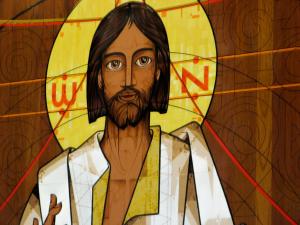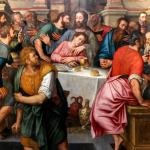
Christians are called to peacemakers, but to do that, they must not confuse peacemaking with doing nothing to confront the forces of darkness and injustice, that is, the forces of sin. They are to be bridge-builders, doing what they can to restore what sin has broken apart or destroyed. They are to work for and promote justice, doing so without falling for some new form of injustice themselves. This is why they must not embrace retributive justice as a means by which they build peace. Instead, they are to work for and promote restorative justice, seeking to heal the harm people have suffered.
As Christians seek peace, they are should seek the kingdom of God, engaging God’s will so that it will be done in and through them on earth as it is in heaven. To do this, to heal the world ravaged by the injustices caused by sin, they must work to overturn the structures of sin in the world as they resist the powers that be, the powers which promote and reinforce injustices and the harm such injustices cause. It is important for Christians to have a proper understanding of the conflict which lies before them. Resisting sin, fighting against the powers that be which seek to reinforce the structures of sin and the damage sin has caused the world, should not be used as justification for ignoring peace-building; rather, Christians must understand that their actions should be to do what can be done to establish justice in the world so that peace can be found in and through such justice. They must especially understand that their fight is not “flesh and blood,” but the structures of sin and the daemonic powers which encourage their creation:
Finally, be strong in the Lord and in the strength of his might. Put on the whole armor of God, that you may be able to stand against the wiles of the devil. For we are not contending against flesh and blood, but against the principalities, against the powers, against the world rulers of this present darkness, against the spiritual hosts of wickedness in the heavenly places. Therefore take the whole armor of God, that you may be able to withstand in the evil day, and having done all, to stand. Stand therefore, having girded your loins with truth, and having put on the breastplate of righteousness, and having shod your feet with the equipment of the gospel of peace; besides all these, taking the shield of faith, with which you can quench all the flaming darts of the evil one. And take the helmet of salvation, and the sword of the Spirit, which is the word of God (Eph. 6:10-17 RSV).
Christians must not go around looking for people to demonize, using such demonization as an excuse to cause such people harm. Christians must not embrace the way of evil, the way of annihilation, by using the way of death and destruction against their enemies. They must realize that no one is absolutely evil, that no one is intrinsically evil. Everyone has good in them. Everyone is loved by God. Everyone is someone God wants to save. Christians are meant to share God’s love for the world. They are to pray that God’s will be done on earth as it is in heaven. They are, of course, to do more than merely pray. They are to join themselves to God’s will and engage the work of Christ, sharing the grace they have been given to others, so that in doing so, they can be seen as those who help Christ bring salvation to the world. They are to take on spiritual weapons, not physical ones, to confront the daemonic forces before them, forces which include those ideologies which not only deny the truth, but have people act against their own (and the common) good. They are to especially take this fight to themselves, that is, to find the places these dark forces stir in theirs souls, and work, with grace, to have that darkness dispelled from their hearts.
Jesus, of course, was engaging peace-building throughout his temporal ministry. He went to people who wanted to be freed from the spiritual darkness, those whom the dark daemonic powers kept trapped and enslaved. He knew people needed to be healed, not only in soul, but in body, because the forces of darkness and sin harm people on both levels of their being. We cannot ignore physical maladies, and when they are made by and established by injustices in the world, we must confront those injustices. Jesus certainly didn’t ignore physical ailments, saying that he came only to heal people in their soul: he came to bring healing to their whole person. He understood physical maladies could harm someone’s spiritual livelihood, creating its own kind of spiritual prison. This is why Luke says a women Jesus healed had for many years suffered under a “spirit of infirmity”:
And there was a woman who had had a spirit of infirmity for eighteen years; she was bent over and could not fully straighten herself. And when Jesus saw her, he called her and said to her, “Woman, you are freed from your infirmity.” And he laid his hands upon her, and immediately she was made straight, and she praised God (Lk. 10:11-13 RSV).
Our confrontation with the powers that be should have us do what we can to heal people in soul and body. We should heal the sick to the best of our abilities. We might not be able to do as much as Christ did, but we should work to promote justice in the world, to make sure that we take care of those in need. We should take an interest in those who been denied their just place in society or their spiritual community. When they are rejected in such a fashion, they easily become depressed, which can leave then infirm, because depression makes it difficult for people to move on and do things for their own good. The way society (and the Christian community) treat its outcasts, showing them contempt instead of good will, demonstrates the way these dark powers that be not only continue to influence society, but Christianity as a whole. We need to realize how we have failed them. We need to realize how we have failed to live to Christ’s expectations. We need to realize we can and should do more. We need to come to those in need, like Christ did with the young woman, and find a way to restore their spirit.
Christians, therefore, are to work for peace, but the peace must be a true and just peace. Without justice, without the promotion of the common good, there will be no true peace. Christians need to discern where the seeds of injustice are found, realizing they exist, not only in society at large, but in themselves. The spiritual battle, therefore, should have Christians take on those seeds, putting them to the fire, so to speak. They are to do what they can to serve Christ, the way of Christ (which is the way of love), following his desire to share God’s peace and salvation to the world. When they forget this, when they turn instead to the way of violence, trying to use such violence as a way to create peace in the world, all they do is create a false peace, one which undermines the true peace of God.
Stay in touch! Like A Little Bit of Nothing on Facebook.
If you liked what you read, please consider sharing it with your friends and family!
N.B.: While I read comments to moderate them, I rarely respond to them. If I don’t respond to your comment directly, don’t assume I am unthankful for it. I appreciate it. But I want readers to feel free to ask questions, and hopefully, dialogue with each other. I have shared what I wanted to say, though some responses will get a brief reply by me, or, if I find it interesting and something I can engage fully, as the foundation for another post. I have had many posts inspired or improved upon thanks to my readers.












